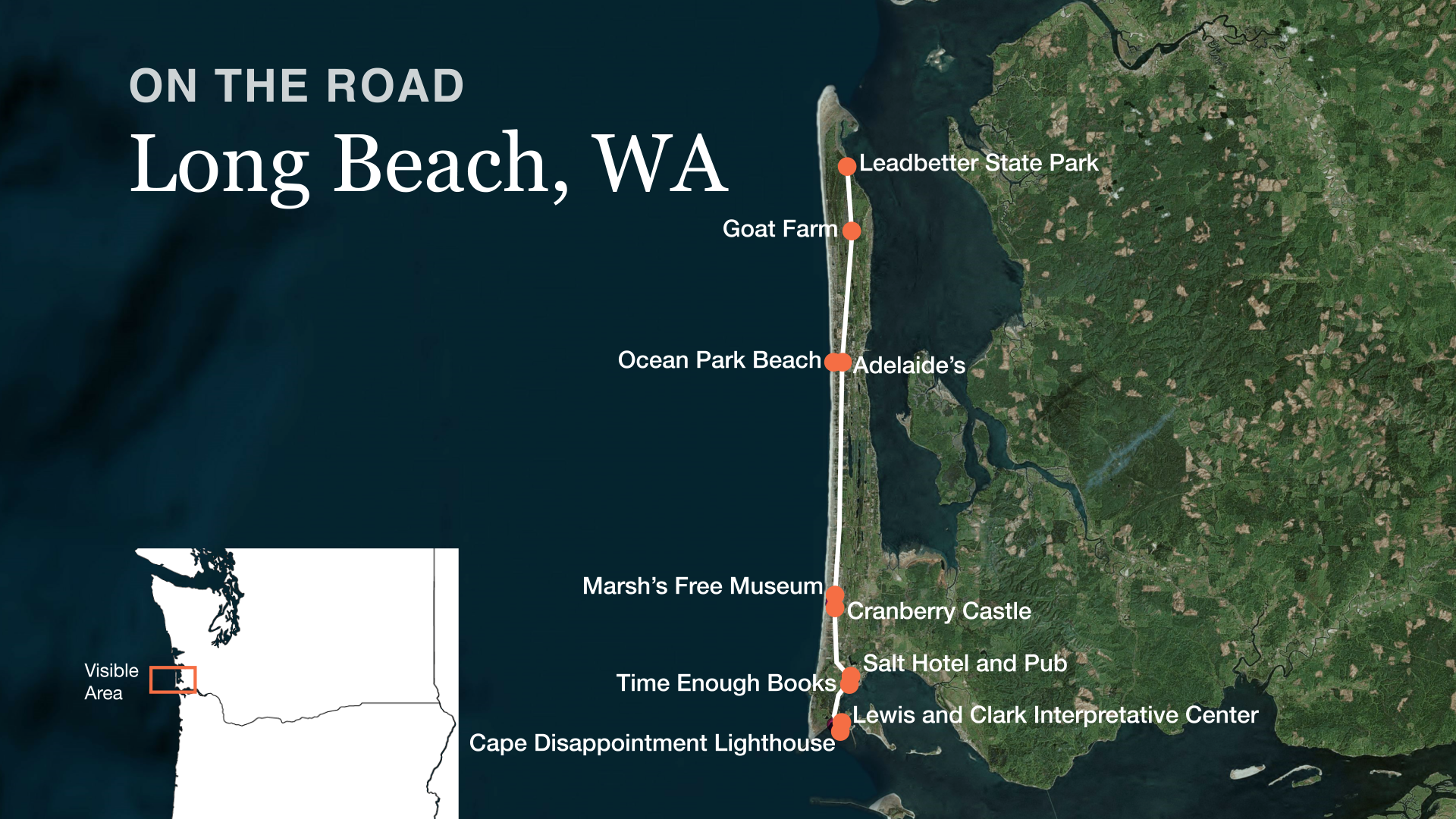
MacGregor Campbell / OPB
On The Road is “Think Out Loud’s” radio road trip series: conversations with wanderers, tourists and residents along Oregon and Washington’s back roads and highways.
It's been more than a year of these occasional and delightful road trips around the region, but we hadn't yet ventured into Washington state. So we decided to started with this this 28-mile stretch of the Long Beach Peninsula. Because: Why not? And: beach.
Stop One: Ocean Park, near the beach
Unlike the vast majority of our other "Think Out Loud" shows, which are decided and focused on well ahead of time, these "On the Road" shows are all about following the whim of "I wonder what's the story over there," and then going to find out.
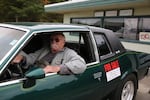
Retiree Bruce Sewell has one too many cars on his hands, so he's selling his 1978 Grand Prix.
Allison Frost / OPB
We were barely out of Long Beach when we came across Bruce Sewell on just such a whim. He was near the beach in Ocean Park, reading a newspaper in the front seat of his dark green, two-door, 1970s sedan for sale, parked in front of a closed cafe.
Sewell says he has five or six cars and it's just time to sell this one. It's a 1978 Grand Prix, by the way, which he's completely rebuilt.
He's retired from a variety of professions, from truck driving to teaching, and he came here for the salmon, steelhead and sturgeon fishing.
"But those fisheries are in a lot of trouble, especially around here," he said. "There's not much to do around here, as far as fishing's concerned. I'm thinking about moving to Arizona, to be honest with you."
Our conversation was interrupted by a big white van pulling up and a woman jumping out, running into the closed cafe and coming out bearing several gallons of milk.
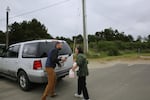
Allison Frost / OPB
She was very energetic and apologetic and in a tremendous hurry. But we managed to gather that she needed the milk for her espresso shop just down the street. We were intrigued — not to mention in need of a morning coffee — so we finished up our conversation with Bruce and went to seek espresso.
Stop Two: Adelaide's, Ocean Park
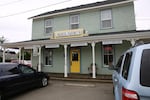
Adelaide's sits just a few hundred yards from the beach in Ocean Park.
Allison Frost / OPB
Just a few hundred yards up the road, we found Adelaide’s. The driver of the white van and owner of the establishment was Coleen Smith. She'd only recently taken over the cafe and closed down the beach restaurant she'd had for the last 38 years. In this new venture at Adelaide's, she's trying to appeal to a younger, bigger crowd, as well as her older regulars. "Think Out Loud" host Dave Miller asked how she's doing that.
"Well, I got some real young, cute girls working for me," she said, letting out what we come to realize is her signature belly laugh — loud and free and nothing if not authentic. "I'm starting things like a lot of fresh salads, like a Thai noodle peanut salad. I'm asking my helpers to tell me what they would like, when they go out, what do they try to get."
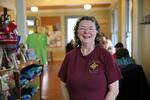
Allison Frost / OPB
She's expanded Adelaide's into a kind of community center, book store and yarn shop. She holds events in the back of the store, like book signings and arts and crafts nights. It's a big change from the other restaurant, close to the beach, focused on comfort food and catering to regulars.
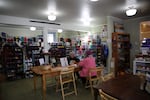
Allison Frost / OPB
"I'm having to break what I feel is my identity." And she says that's not necessarily easy or quick, after 38 years of doing basically the same thing.
But Smith says she can't complain. Business is pretty good, she's eating healthier herself, and she's enjoying the more dynamic environment. It seems to fit her.
Stop Three: Leadbetter Point State Park
The farthest north our van would drive to was the parking lot of the Leadbetter Point State Park. It was early, so it was pretty deserted. At least, that's why we thought it was deserted. We started driving out of the park and came across a guy parked in his truck on the side of the road.
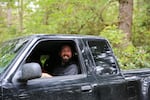
Jason Johnson works on an oyster farm. He parks here in the morning before his 12 hour day starts — with about a mile and a half hike to the farm.
Allison Frost / OPB
We got out to talk to him and were immediately consumed by mosquitoes — so many huge mosquitoes. Jason Johnson works on an oyster farmer and was a man of few words and very good bug spray.
"What's the best thing about your job?" Dave asked.
"Getting to work outside," he said.
Dave immediately followed up: "What's the worst thing about your job?"
"Getting to work outside."
After just a few more questions, and several more mosquito bites, we decided we agreed with him on that last point. So we thanked him and ran back to the van, swatting and waving at the air in front of us.
Stop Four: The Goat Farm
Just a few miles south of Leadbetter Point State Park, and a few vanquished van mosquitoes later, we saw this:
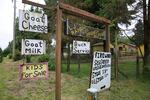
City slickers, seeing the yellow, pink-framed "Kids For Sale" sign, become inordinately intrigued. "Buck service"?
Allison Frost / OPB
An invitation if we ever saw one, so we accepted, and followed the signs and parked beside what appeared to be the farmhouse garage. The 70-something man that ambled genially out into the driveway to greet us was a goat farmer by the name of Jerry Busenius. His 9-year-old grandson Sam Hoffman was not far behind.
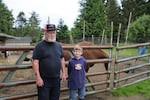
Goat farmer Jerry Busenius and his nine-year-old apprentice and grandson, Sam Hoffman.
Allison Frost / OPB
Busenius has about 30 goats in various stages of life, and he picks names beginning with the same letter for the new ones, successive letters of the alphabet every year, so he can tell them apart. The new bunch have names like Ivy, Izzie, Icky and Isabell. He keeps the boombox in the goat shed tuned to a local country station.
"They like it and it keeps them calm," he said.
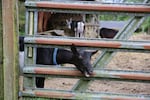
A black goat pokes its head out of the barn gate at the Busenius goat farm.
Allison Frost / OPB
Sam said he gets to spend a lot of time on the farm, since he’s homeschooled. He's seen goats being born and has learned a lot about raising goats and taking care of different animals on a farm. It's a lot of work, but he says he doesn't think he'd be learning as much in a regular school.
He sells the milk, and makes cheese and goat milk soap for sale as well. And of course, the kids themselves are for sale, as the sign says. Does he also eat goat meat? Dave asked.
"No way, these are our buddies," Busenius said. "The thought of eating them would turn my stomach."
Stop Five: Time Enough Books, Ilwaco
Time Enough Books in Ilwaco had been recommended by more than one person, so we drove down to check it out. Bill Ham was behind the counter, in fact the only person in the store. We talked for a while and realized, there was something dramatic about his manner, and Dave asked if he was an actor.
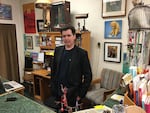
Bill Ham is a local actor in Ilwako, Washington, pictured here at his job at Time Enough Books.
Dave Miller / OPB
"You can tell because I'm obviously broke, yes," Ham said.
Ham said he recently performed a one-man show in nearby Astoria, Oregon, titled, "This Show is Not Yet Titled." Focus, he said, was not his strong suit.
But one thing he was sure of: that the Peninsula is a special place. There's something magnetic and "nurturing" about this place, he told us, despite the fact that there's "not very much going on," a something that's kept him here for 13 years.
"There's a good reason why there's a lot of artists in the area. People who can express these kinds of things without resorting to words, which is probably not a great thing to say for somebody who works in a book store. But you know, there are some things that words can't contain."
Stop Six: Port of Ilwaco
Del and Carol Addis are two people who appreciate the magnetism of the area. They live in Missoula, Montana, but they have made the Peninsula their yearly vacation spot for well over a decade.
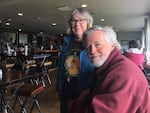
Carol and Del Addis at Salt, a restaurant overlooking the Ilwako harbor.
"It's my beach," Carol said. "[Last year] we saw about 100 whales probably, go by. This morning we saw 14 or 15 eagles on the beach."
"We live in a beautiful place," Del said, "but there's no ocean. So it's a change of venue, and it's become a tradition, really."
The one thing they said we had to do besides walk on the beach? Eat, they said. Salt is just one of the great restaurants around here.
It was getting close to lunch time, but we decided we wanted to try to find a fisherman in the harbor who'd tell us what he was up to.
We met Paul Munowitch, who was working with a small crew to fix up the Amanda C.
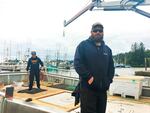
Fisherman Paul Munowitch has been fishing for most of his adult life.
He said years ago he was able to make a good living as a fisherman, but with declining fish stocks, it's getting harder every year. Munowitch said he came up here from California, where regulations are much more restrictive.
"They think we're depleting the oceans and killing whales and seals and everything else, which is isn't true. None of us want to overfish anything. If we overfish it, we're out of a job," Munowitch said. "So the biggest conservationists, as far as the fish stocks go, are us ... we're the ones that want to makes sure there's fish to catch for the future generations too."
We finally felt we'd earned our lunch, so we headed back to Salt and ordered. But we couldn't help but notice the two uniformed Coast Guards sitting at the next table, and curiosity got the best of us.

Ryan O'Meara is taking over the U.S. Coast Guard National Motor Lifeboat School. He takes the command from retiring officer Kevin Clark.
Allison Frost / OPB
Before our food could arrive, Dave had his microphone out and politely asked for their story.
Kevin Clark runs what's the National Motor Life Boat School, known nationally as the place to train for rough weather. He's turning over command to his friend and colleague, Ryan O'Meara — who said he's very excited about about his new role.
"It's one of those jobs where you get to leave an impact on the service, when you train all the new members ... you teach them how to operate the boat under the worst conditions that the United States has to offer," O'Meara said.
For his part, Clark will miss the Coast Guard but he's ready to retire, he said. "I'm looking for maybe a little bit different lifestyle than what I've been living for the past 30 years ... a little less structure, maybe a little bit more freedom to do what I want to do."
Stop Seven: Cranberry Castle and Marsh's Free Museum, Long Beach
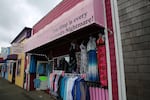
A shop gift shop on Pacific Avenue, in Long Beach, Washington.
Allison Frost / OPB
Every time we passed this sign, we would sigh or shake our heads or groan. It seemed to belong to an earlier era, to say the least.
It was right along Pacific Avenue/Washington State Route 103, which cuts through Longview and basically runs up the Peninsula. After the third or fourth pass, we decided to stop.
The woman working at the counter did not want her picture taken or her name used but she was quick to tell us that her boss put up that sign, about 15 years ago, when he sold "crafter items," and you could hardly get through the packed store.
These days, she said, the store sells thing like sweatshirts, rain boots, dresses and more mass market souvenirs.
"When the wives or significant others come in, we tell them, now make sure that they buy lots of things so that's his nightmare because he has to pay for everything," she said. "So it's still a 'husband's nightmare,' by all means."

Inside Cranberry Castle gift shop, better known to the "Think Out Loud" team in Long Beach as "Every Husband's Nightmare."
Allison Frost / OPB
If you have ever been to Long Beach Washington there is absolutely no way you can miss the notice of the local attraction known as “Jake, The Alligator Man” and the enormous store called Marsh's Free Museum.
You could choose not to check out this local attraction, but what would be the fun in that? A very kind Marsh's Free Museum employee named Carrie Carpenter showed us around the place, starting with the larger-than-life sized statues out front.
Carpenter guided us past the supposedly real human skeleton which greets you at the front door, through displays of souvenirs of every conceivable type, to the very back of the store.
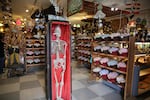
A female skeleton greets patrons of Marsh's Free Museum when they walk in the front doors.
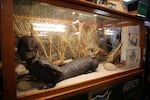
"Jake, The Alligator Man" has been described (in the Weekly World News tabloid and the like) as the "missing link."
Allison Frost / OPB
There was Jake, in all his glory. He was literally created out of the pages of the Weekly World News, but Carrie Carpenter said he's been a real tourist draw and source of income for Marsh's since he "arrived" in the 90s.
"And then on his birthday [in August], they take him out of that cage, and they take him to different places, like the taverns and different other places so people can visit with him."
Stop Nine: A Lookout
On our way to Cape Disappointment we saw these two young men leaning against the concrete barrier wall. Henry Torres and Terry Gilbert were taking a lunch break from a floor installation job they were doing in a nearby house.

Henry Torres and Terry Gilbert take a lunch break from a near by job installing flooring.
Allison Frost / OPB
Dave got deep into conversation with them and before long they were talking about all sorts of topics, including the fact that they were both single. Henry, in his mid-30s, said he was waiting for his "media naranja," his soulmate (literally his "half-orange"). Originally from El Salvador, Henry is still practicing his English. Terry helps him with that, in addition to the paid help with installing floors.
Terry is learning Spanish from Henry too and is also waiting for his "media naranja." In his early 20s still, he admits he still has a lot of time.
Stop 10: Cape Disappointment
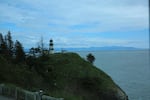
Park ranger Aaron Webster says the Cape Disappointment Lighthouse is the oldest operating lighthouse in the Pacific Northwest.
Allison Frost / OPB
The last stop on our journey was Cape Disappointment State Park. We met Gwendolyn Jones and her two kids, Tia and Taylor, who had just been to the lighthouse.

Gwendolyn Jones and her children Tia and Taylor are visiting the Long Beach Peninsula from Houston, Texas.
Allison Frost / OPB
The Joneses were on a trip from Houston, Texas. They'd been all over the Peninsula over the last week or so. Tia and Taylor's favorite part of the trip, they told Dave, was the horseback riding on the beach. Gwendolyn said it had been a great trip, but:
"I got cows, so I gotta get back ... I got babies I gotta get branded, so we have things like that we need to do. My dad died and left me this task. It's been in our family for 200 years, so somebody has to do it," she said.
We hiked up the hill to the Lewis & Clark Interpretive Center. We asked if there was anyone who could show us around and sure enough before too long, the “interpretive specialist” at Cape Disappointment, Park Ranger Aaron Webster, dropped what he was doing to make some time for us.
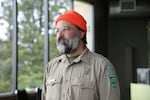
Cape Disappointment Park Ranger Aaron Webster is a interpretive specialist, which means he knows both the history and landscape of the area inside and out.
Allison Frost / OPB
He said the question of why the cape is name "Cape Disappointment" is one he must get 20 times a day. He works to keep it sounding fresh every time but occasionally, he admits, it's a little like a musician being asked to play the same song again and again.
Cape Disappointment is so named, because of the explores who came before Lewis and Clark were looking for the mouth of the Columbia but mistook the opening for just another bay. Webster said a lot of otherwise good navigators made the same mistake.
“The ocean to me is like a huge wilderness. That’s one reason I like to live near the ocean,” Webster said. “So being here at Cape Disappointment, I’m right on the edge of something ... go too far west around here, and you’re really putting your life in danger. And that’s one of the draws of this place — not the danger — but just being able to be close to it is thrilling, I think.”
